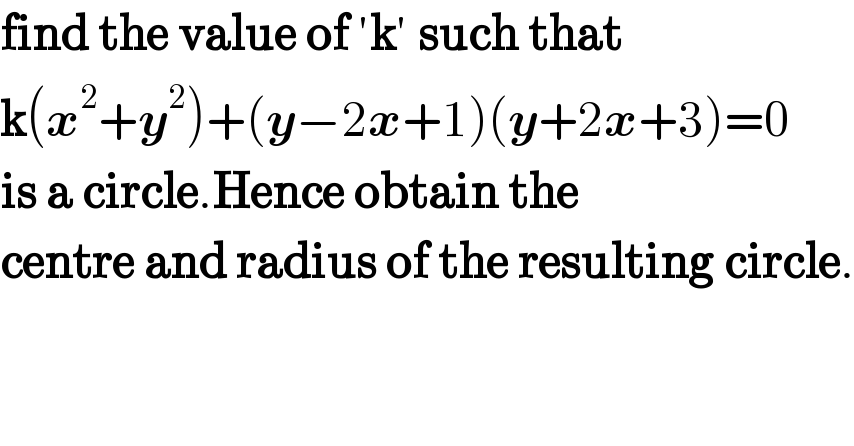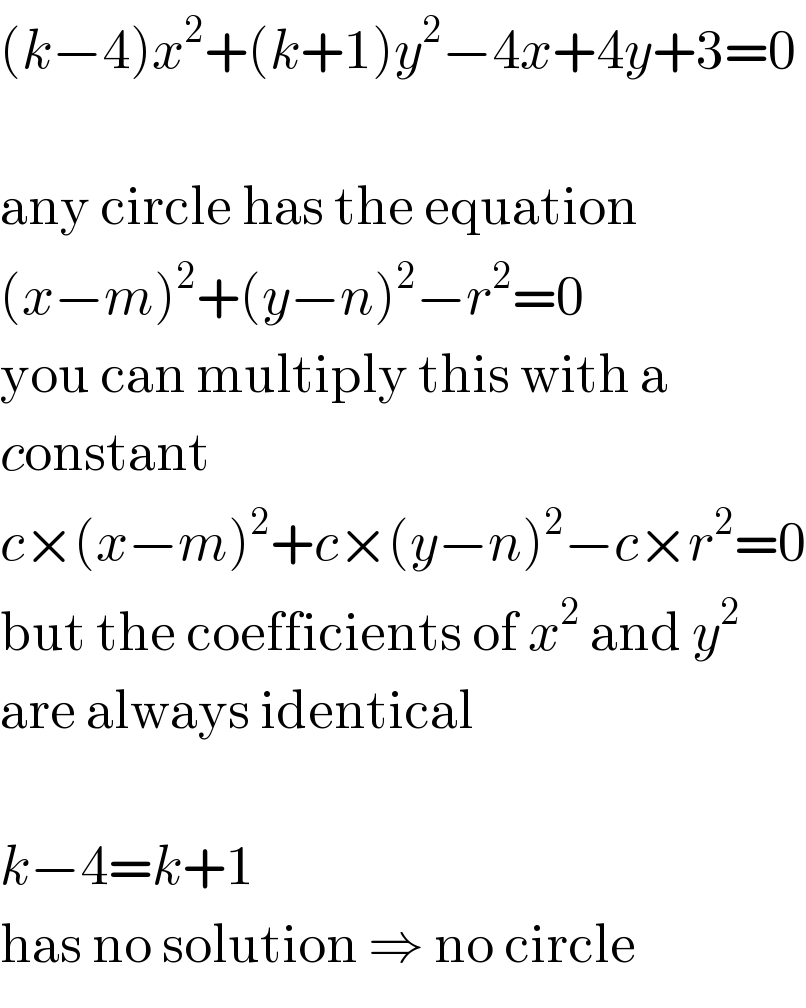Question Number 33511 by mondodotto@gmail.com last updated on 18/Apr/18

$$\boldsymbol{\mathrm{find}}\:\boldsymbol{\mathrm{the}}\:\boldsymbol{\mathrm{value}}\:\boldsymbol{\mathrm{of}}\:'\boldsymbol{\mathrm{k}}'\:\boldsymbol{\mathrm{such}}\:\boldsymbol{\mathrm{that}} \\ $$$$\boldsymbol{\mathrm{k}}\left(\boldsymbol{{x}}^{\mathrm{2}} +\boldsymbol{{y}}^{\mathrm{2}} \right)+\left(\boldsymbol{{y}}−\mathrm{2}\boldsymbol{{x}}+\mathrm{1}\right)\left(\boldsymbol{{y}}+\mathrm{2}\boldsymbol{{x}}+\mathrm{3}\right)=\mathrm{0} \\ $$$$\boldsymbol{\mathrm{is}}\:\boldsymbol{\mathrm{a}}\:\boldsymbol{\mathrm{circle}}.\boldsymbol{\mathrm{Hence}}\:\boldsymbol{\mathrm{obtain}}\:\boldsymbol{\mathrm{the}} \\ $$$$\boldsymbol{\mathrm{centre}}\:\boldsymbol{\mathrm{and}}\:\boldsymbol{\mathrm{radius}}\:\boldsymbol{\mathrm{of}}\:\boldsymbol{\mathrm{the}}\:\boldsymbol{\mathrm{resulting}}\:\boldsymbol{\mathrm{circle}}. \\ $$
Answered by MJS last updated on 18/Apr/18

$$\left({k}−\mathrm{4}\right){x}^{\mathrm{2}} +\left({k}+\mathrm{1}\right){y}^{\mathrm{2}} −\mathrm{4}{x}+\mathrm{4}{y}+\mathrm{3}=\mathrm{0} \\ $$$$ \\ $$$$\mathrm{any}\:\mathrm{circle}\:\mathrm{has}\:\mathrm{the}\:\mathrm{equation} \\ $$$$\left({x}−{m}\right)^{\mathrm{2}} +\left({y}−{n}\right)^{\mathrm{2}} −{r}^{\mathrm{2}} =\mathrm{0} \\ $$$$\mathrm{you}\:\mathrm{can}\:\mathrm{multiply}\:\mathrm{this}\:\mathrm{with}\:\mathrm{a} \\ $$$${c}\mathrm{onstant} \\ $$$${c}×\left({x}−{m}\right)^{\mathrm{2}} +{c}×\left({y}−{n}\right)^{\mathrm{2}} −{c}×{r}^{\mathrm{2}} =\mathrm{0} \\ $$$$\mathrm{but}\:\mathrm{the}\:\mathrm{coefficients}\:\mathrm{of}\:{x}^{\mathrm{2}} \:\mathrm{and}\:{y}^{\mathrm{2}} \\ $$$$\mathrm{are}\:\mathrm{always}\:\mathrm{identical} \\ $$$$ \\ $$$${k}−\mathrm{4}={k}+\mathrm{1} \\ $$$$\mathrm{has}\:\mathrm{no}\:\mathrm{solution}\:\Rightarrow\:\mathrm{no}\:\mathrm{circle} \\ $$
Commented by mondodotto@gmail.com last updated on 18/Apr/18

$$\mathrm{thanx}\:\mathrm{a}\:\mathrm{lot}\:\mathrm{god}\:\mathrm{bless}\:\mathrm{you} \\ $$
